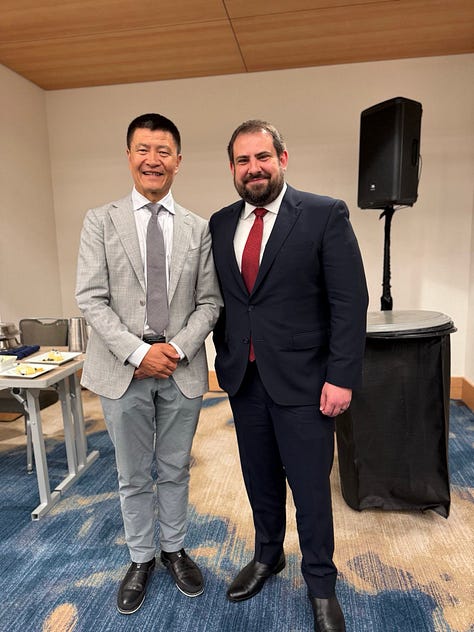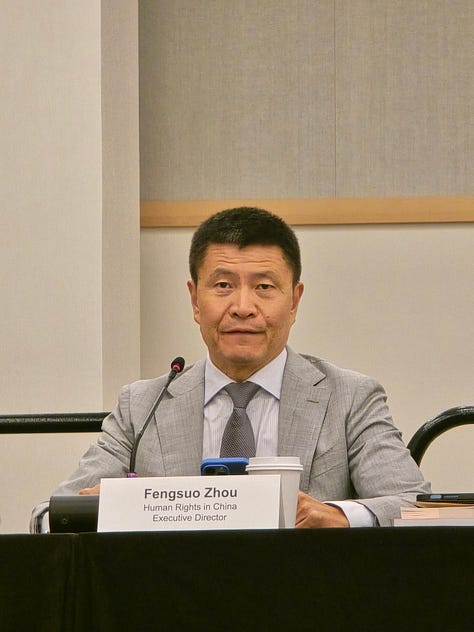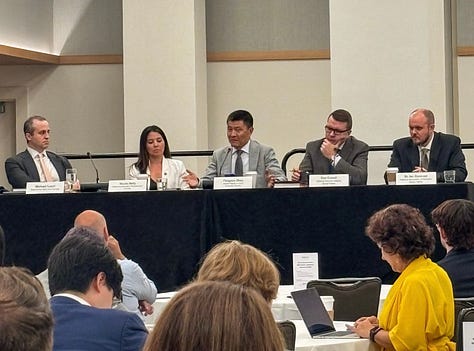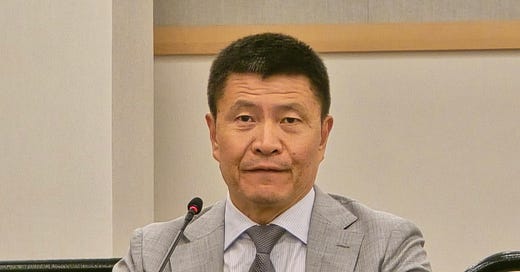HRIC Executive Director Pushes for Measures to Counter Protect Students Against CCP Transnational Repression on US Campuses
On June 24, HRIC Executive Director Fengsuo Zhou joined a panel of education experts at an event hosted by State Senator Eliot Bostar in Lincoln, Nebraska. The panel focused on the CCP’s involvement in higher education in the United States, particularly the threat of transnational repression and silencing of free speech, and discussed possible solutions to the problem.
Executive Director Zhou spoke about his experience working with Chinese pro-democracy students. Over the last two decades, he has worked to promote freedom and democracy among Chinese students and to support them in organizing themselves on-campus. In recent years there has been an uptick in activity due to the White Paper Movement. Still, due to the CCP’s transnational repression and the generally hostile atmosphere, students who speak up are the exception. Those who stand up publicly live in fear because of CCP presence on campus through online and offline surveillance, monitoring, and harassment, including from other student organizations such as the Chinese Students and Scholars Association (CSSA). Hundreds of students have reported being questioned by the authorities about protesting overseas when they return to China, and even their families have been harassed and threatened. Zhou has worked closely with these students to protect them, and shared guidance among the students to help them avoid CCP persecution.
Zhou further proposed several specific measures to counter CCP influence on campus. Some panelists suggested that CCP-supported groups such as CSSAs register under the United States Foreign Agents Law, but Zhou emphasized that a larger problem is how many international students remain shielded from so-called “sensitive” issues such as the Tiananmen Massacre and the Chinese government’s oppressive actions against Tibetans, Uyghurs, Hong Kongers, and more. Zhou suggested that CSSAs should be required to undergo a certification process that includes teaching on these issues that the CCP wishes to keep hidden, so that all students can make informed decisions and understand basic facts about these major issues.
Zhou believes that education is a key element of defense. Without an understanding of these important events from their own history, and coming from a background that emphasizes silence over free speech, many Chinese international students are susceptible to being manipulated into promulgating the CCP’s message, whether willingly or unwillingly, and even attacking people with differing opinions. Pro-democracy Chinese students have experienced other international students physically tearing down flyers about topics like Tiananmen, shouting at protestors, and threatening to tell the Chinese authorities about their activism.
On many occasions, Chinese students have even been bussed in to participate in events where there have been attacks against pro-democracy protestors. When Chinese president Xi Jinping visited San Francisco in 2023 for the APEC summit, hundreds of students from southern California were bussed in to participate in the pro-Xi rallies, where several pro-democracy protestors suffered injuries. It is not clear whether any students were directly involved in attacking protestors, but is clear that international students are a population that can be weaponized by the CCP against dissenters by telling them that they must protect their national pride against ill-willed saboteurs such as Zhou. Some students have even contacted professors to protest Zhou speaking on their campuses, claiming that his presence would be offensive to their national pride. While some may act maliciously, many students have simply been trained to believe in the CCP’s perspectives, and have never been confronted with serious opposition. Catering to these students’ demands and depriving them of opportunities for critical thought and discussion not only does them a disservice in terms of their education, it also puts dissenting students in real danger of retaliation and harassment.
Zhou further emphasized the role of WeChat, a popular Chinese messaging app, as a platform for CCP influence. Because of the extensive features offered by the app that encompass all the utilities someone might need, from food delivery to payments to news to communication, many Chinese students live within the bubble of WeChat, which creates an online platform that is free from university scrutiny. In the Berklee College of Music case, where a student threatened to cut off the hands of a fellow Chinese international student, he naturally chose to make the threats over WeChat. Within this CCP controlled domain, pro-CCP students feel protected and emboldened to target dissenters. Furthermore, student groups use WeChat to organize and raise money without the knowledge of the university.
From Zhou’s experience, however, universities themselves are frequently unwilling to move against the CCP, even when their own students and their rights are on the line. Many schools have institutionalized CCP fear and censorship under the excuse of keeping students safe and respecting their space, while inadvertently prioritizing the demands of some students over the needs of the more vulnerable. Many schools even follow the same topic restrictions that the CCP implements in China, avoiding discussion of the Tiananmen Massacre and Uygur repression for the sake of pleasing powerful donors.
There are no perfect solutions to these problems. However, Zhou emphasized, universities have a responsibility to teach their students about the world and to protect and encourage them in expressing themselves openly, without fear.






